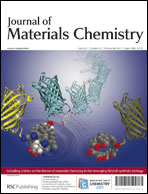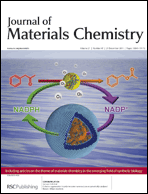Journal of Materials Chemistry will publish a themed issue on Organic Optoelectronic Materials in 2012. Please contact the editorial office if you would like to contribute an article.
The Guest Editors of the issue will be Professors Wenping Hu (ICCAS, China), Klaus Müllen (MPI-P Mainz, Germany) and Zhenan Bao (Stanford University). The themed issue is dedicated for the celebration of Prof. Daoben Zhu’s 70th birthday.
Organic Optoelectronic Materials with special functionalities stem from the increasing ability to manipulate and tune the optoelectronic properties of organic and polymeric materials. This was achieved through the systematic variation of their molecular components, to allow for molecular-level control of the solid-state structure via arrangement of the functional molecular components into a defined solid architecture.
With the development in materials, a number of applications have shown great promise for practical applications. Organic light-emitting diodes made the development of a superior flat-panel display technology possible. This display technology has been used in diverse applications ranging from cellular phones to large-area high-definition television screens. Organic solar cells now can reach quantum efficiency over 9%, which makes them attractive for delivering cheap solar power. Organic field-effect transistors have resulted in a revolution in developing fast and inexpensive integrated circuits based on organic semiconductor elements. When combined with the advantage of solution processability, organic semiconductors allow for the use of a variety of printing techniques, such as inkjet printing and stamping, to fabricate large area devices at low cost. The mechanical properties of organic semiconductors also allow for flexible electronics. However, the most distinguishing feature of organic semiconductors is their chemical versatility, which permits the incorporation of functionalities through molecular design. Organic integrated circuits have already been realized, which has accelerated the development of “plastic electronics” and “printed electronics”.
The aim of the themed issue focuses on organic and polymer materials with high electroluminescent efficiency for organic light-emitting diodes, with high quantum efficiency for organic solar cells, with high mobility for organic field-effect transistors, and so on. Certainly, it is a highly interdisciplinary science, the research and development of organic optoelectronic materials continually derives ideas, methods, and technologies from other research fields. Knowledge, results and techniques derived from chemistry, physics, materials science, semiconductors, electronics, nanotechnology and biology have been adopted in the design and development of organic optoelectronic materials. For example, the understanding of how the properties of materials impact their microstructure, and in turn how they affect device performance; modification and control of the interface between organic layers and organic/metal electrode; the understanding the processes that contribute to the operation of organic devices; and the integration of organic elements with existing silicon technology to realize high performance electronic devices and circuits, have all been crucial in the development of organic electronics and their corresponding applications.
Journal of Materials Chemistry wishes to publish original research that demonstrates novelty and advance, either in the chemistry used to produce materials or in the properties/applications of the materials produced. All manuscripts will be handled by the Journal of Materials Chemistry Editorial office and refereed in accordance to the standard procedures of the journal.
The deadline for the receipt of manuscripts for this themed issue is 3rd October 2011.
Manuscripts can be submitted using the RSC’s on-line submissions service. Please clearly mark that the manuscript is submitted for the themed issue on Organic Optoelectronic Materials. We very much hope that you will be able to contribute to this themed issue and look forward to hearing from you at your earliest convenience.
Professor Wenping Hu, Guest Editor
Professor Klaus Müllen, Guest Editor
Professor Zhenan Bao, Guest Editor
Dr Liz Davies, Editor, Journal of Materials Chemistry

















 Benefits of N for O substitution in polyoxoanionic electrode materials: a first principles investigation of the electrochemical properties of Li2FeSiO4−yNy (y = 0, 0.5, 1)
Benefits of N for O substitution in polyoxoanionic electrode materials: a first principles investigation of the electrochemical properties of Li2FeSiO4−yNy (y = 0, 0.5, 1)

 The influence on Fermi energy of Li-site change in LizTi1−yNiyS2 on crossing z = 1
The influence on Fermi energy of Li-site change in LizTi1−yNiyS2 on crossing z = 1